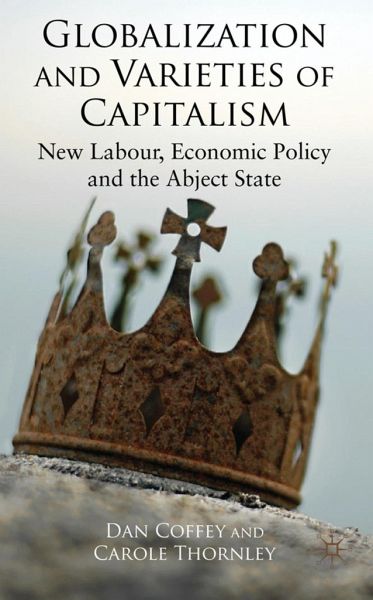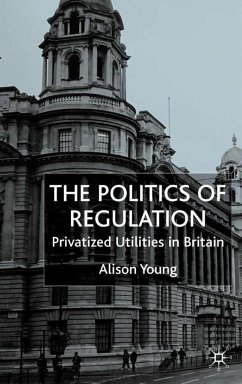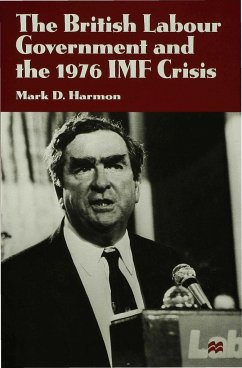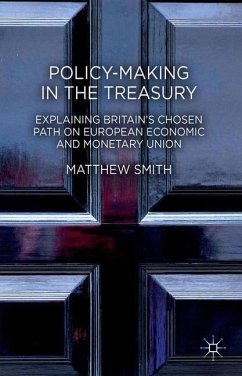
Globalization and Varieties of Capitalism
New Labour, Economic Policy and the Abject State
Versandkostenfrei!
Versandfertig in 6-10 Tagen

PAYBACK Punkte
19 °P sammeln!





A study of Britain as a capitalism poised between American and European models, exploring themes of legitimation, denial and opportunism via a series of substantial case studies framed by a reinterpretation of Thatcherism's economic contexts and a critical assessment of New Labour.
DAN COFFEY is Senior Lecturer in Economics at Leeds University Business School, UK, and has research interests in global political economy, state economic policy, and the social construction of production systems. He publishes in a range of journals and is author of a recent major study of the world auto industry. CAROLE THORNLEY is Senior Lecturer in the School of Economic and Management Studies at the University of Keele, UK, and has research interests in globalization, employment systems and structures, equalities, industrial organization and public policy. She previously worked for several major manufacturing multinationals, and is widely published in books and journals.
Produktdetails
- Verlag: Macmillan Education / Palgrave Macmillan UK / Springer Palgrave Macmillan
- Artikelnr. des Verlages: 978-0-230-55309-5
- 2009 edition
- Seitenzahl: 188
- Erscheinungstermin: 21. August 2009
- Englisch
- Abmessung: 221mm x 143mm x 18mm
- Gewicht: 341g
- ISBN-13: 9780230553095
- ISBN-10: 0230553095
- Artikelnr.: 23816733
Herstellerkennzeichnung
Libri GmbH
Europaallee 1
36244 Bad Hersfeld
gpsr@libri.de
'...a controversial but fascinating book...a must-read for all our politicians.' The Independent
'For far too long, studies of UK economic and social policy have failed to engage adequately with the rich literature now available on the varieties of capitalism elsewhere. But no longer.
Dan Coffey and Carole Thornley have done us the very great service of illuminating UK experience by setting it in its wider theoretical and comparative context, and of refining our understanding of that context by placing the UK at its core. If read widely, as it deserves to be, this book should change the way we understand the character and limits of New Labour in power.' - David Coates, Worrell Professor of Anglo-American Studies, Wake
'For far too long, studies of UK economic and social policy have failed to engage adequately with the rich literature now available on the varieties of capitalism elsewhere. But no longer.
Dan Coffey and Carole Thornley have done us the very great service of illuminating UK experience by setting it in its wider theoretical and comparative context, and of refining our understanding of that context by placing the UK at its core. If read widely, as it deserves to be, this book should change the way we understand the character and limits of New Labour in power.' - David Coates, Worrell Professor of Anglo-American Studies, Wake
Mehr anzeigen
Forest University, USA
'The mapping of state guises as commanding, self-effacing, self-deceiving and abject is revealing and instructive, and relevant to all Western countries. This mapping highlights insidious policy incompetence, framed by a rhetoric of legitimation and denial. In its historically-grounded and nuanced analysis, this book exposes the depth of state complicity with the corporate project, and challenges the tendency of states to eschew responsibility by shifting blame to global forces out of their control. The intriguing and gendered deconstruction of the state as model employer offers a sobering account of horizontal and vertical segregation, low wages and part time work among the feminized public sector labour force, and a forceful reminder that gains for women workers are a result of organized militancy.
A persuasive and timely analysis as governments take on a newly-visible 'activist' role in the profound international crisis of capitalism which is currently unfolding.' Prof Linda Briskin, York University, Toronto, Canada
'This timely book places New Labour and its continuation of the Thatcherite experiment with 'capitalism unleashed' in its historical context. Its evidence and focus concerns the UK, but it is also aimed at all those Europeans and others who were and are tempted by the siren logic of rolling back state regulations of capital movements and worker protections against commodification. Its detailed analysis of UK state-global capital relations provides a rigorous antidote to fatalistic determinism. Above all, Dan Coffey and Carole Thornley demonstrate that the national state remains an independent actor, hence with a continuing potential to sustain new and better varieties of societal organization.' - Steve Jefferys,Professor of European Employment Studies, London Metropolitan University, London, UK
'For those wishing to gain a deeper understanding of where New Labour was seeking to position itself and why opportunities were wasted, this hugely enjoyable and detailed book is essential reading.' - Tim Sandle, St Albans CLP and Secretary of Unite North West London Health Branch
'The book is a useful addition to existing work on the nature of capitalism in the UK. The authors allow the reader an opportunity to consider the British economy withinbothits historical and global contexts and provide a timely analysis of British capitalism at the conclusion of the New Labour era.' - Douglas Martin, University of Strathclyde
'The mapping of state guises as commanding, self-effacing, self-deceiving and abject is revealing and instructive, and relevant to all Western countries. This mapping highlights insidious policy incompetence, framed by a rhetoric of legitimation and denial. In its historically-grounded and nuanced analysis, this book exposes the depth of state complicity with the corporate project, and challenges the tendency of states to eschew responsibility by shifting blame to global forces out of their control. The intriguing and gendered deconstruction of the state as model employer offers a sobering account of horizontal and vertical segregation, low wages and part time work among the feminized public sector labour force, and a forceful reminder that gains for women workers are a result of organized militancy.
A persuasive and timely analysis as governments take on a newly-visible 'activist' role in the profound international crisis of capitalism which is currently unfolding.' Prof Linda Briskin, York University, Toronto, Canada
'This timely book places New Labour and its continuation of the Thatcherite experiment with 'capitalism unleashed' in its historical context. Its evidence and focus concerns the UK, but it is also aimed at all those Europeans and others who were and are tempted by the siren logic of rolling back state regulations of capital movements and worker protections against commodification. Its detailed analysis of UK state-global capital relations provides a rigorous antidote to fatalistic determinism. Above all, Dan Coffey and Carole Thornley demonstrate that the national state remains an independent actor, hence with a continuing potential to sustain new and better varieties of societal organization.' - Steve Jefferys,Professor of European Employment Studies, London Metropolitan University, London, UK
'For those wishing to gain a deeper understanding of where New Labour was seeking to position itself and why opportunities were wasted, this hugely enjoyable and detailed book is essential reading.' - Tim Sandle, St Albans CLP and Secretary of Unite North West London Health Branch
'The book is a useful addition to existing work on the nature of capitalism in the UK. The authors allow the reader an opportunity to consider the British economy withinbothits historical and global contexts and provide a timely analysis of British capitalism at the conclusion of the New Labour era.' - Douglas Martin, University of Strathclyde
Schließen
Für dieses Produkt wurde noch keine Bewertung abgegeben. Wir würden uns sehr freuen, wenn du die erste Bewertung schreibst!
Eine Bewertung schreiben
Eine Bewertung schreiben
Andere Kunden interessierten sich für











